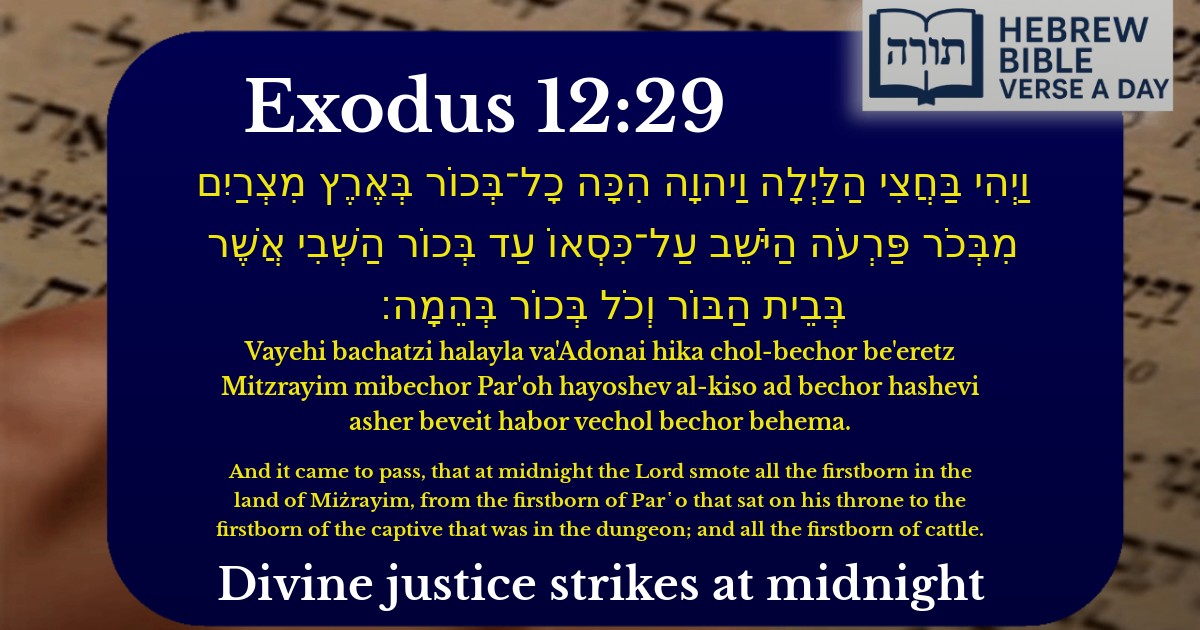Join Our Newsletter To Be Informed When New Videos Are Posted
Join the thousands of fellow Studends who rely on our videos to learn how to read the bible in Hebrew for free!
Hebrew Text
וַיְהִי בַּחֲצִי הַלַּיְלָה וַיהוָה הִכָּה כָל־בְּכוֹר בְּאֶרֶץ מִצְרַיִם מִבְּכֹר פַּרְעֹה הַיֹּשֵׁב עַל־כִּסְאוֹ עַד בְּכוֹר הַשְּׁבִי אֲשֶׁר בְּבֵית הַבּוֹר וְכֹל בְּכוֹר בְּהֵמָה׃
English Translation
And it came to pass, that at midnight the Lord smote all the firstborn in the land of Miżrayim, from the firstborn of Par῾o that sat on his throne to the firstborn of the captive that was in the dungeon; and all the firstborn of cattle.
Transliteration
Vayehi bachatzi halayla va'Adonai hika chol-bechor be'eretz Mitzrayim mibechor Par'oh hayoshev al-kiso ad bechor hashevi asher beveit habor vechol bechor behema.
Hebrew Leining Text
וַיְהִ֣י&thinsp
וַיְהִ֣י&thinsp
🎵 Listen to leining
Parasha Commentary
📚 Talmud Citations
This verse is quoted in the Talmud.
📖 Berakhot 4a
The verse is referenced in a discussion about the timing of the midnight prayer (Tikkun Chatzot), where the Sages debate whether 'midnight' should be calculated as exactly halfway through the night or as a general time period.
📖 Pesachim 120b
The verse is cited in the context of discussing the exact timing of the Exodus from Egypt, particularly the moment when the firstborn were struck at midnight.
📖 Megillah 21a
The verse is mentioned in a discussion about the importance of studying Torah at night, drawing a parallel to the divine intervention that occurred at midnight during the Exodus.


The Timing of the Plague
The verse states that the plague occurred "בַּחֲצִי הַלַּיְלָה" (at midnight). Rashi (Shemot 12:29) explains that Hashem performed the plague precisely at midnight to demonstrate His exact control over time. This precision also prevented any confusion or doubt among the Egyptians, as they could not claim the deaths occurred naturally or at a different time. The Midrash (Shemot Rabbah 18:12) adds that midnight was chosen because it is a time when people are usually asleep, emphasizing that the plague was a direct divine intervention, not a coincidence.
The Scope of the Plague
The verse details the comprehensive nature of the plague, affecting "מִבְּכֹר פַּרְעֹה... עַד בְּכוֹר הַשְּׁבִי" (from Pharaoh’s firstborn to the captive’s firstborn). The Ramban (Shemot 12:29) notes that this demonstrates divine justice—no one was spared, regardless of social status. Even those imprisoned in dungeons, who might have been innocent of oppressing Bnei Yisrael, were included, teaching that the entire Egyptian society was complicit in the enslavement.
The Inclusion of Animals
The verse concludes by mentioning "וְכֹל בְּכוֹר בְּהֵמָה" (all the firstborn of cattle). The Talmud (Bava Kamma 60a) explains that this was a punishment measure-for-measure: since the Egyptians worshipped animals (such as the ram, which was associated with their deity Khnum), their deities were powerless to protect even their own firstborn. Additionally, the Ibn Ezra (Shemot 12:29) suggests that this reinforced the distinction between the Egyptians and Bnei Yisrael, whose animals were spared.
Divine Justice and Precision